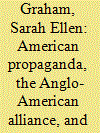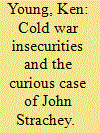| Srl | Item |
| 1 |
ID:
089216


|
|
|
|
|
| Publication |
2009.
|
| Summary/Abstract |
While highly sensitive to embarrassment by us, the British exhibit a distressing lack of sympathy for the discomfiture to which we are exposed because of our association with them.1
Being for the most part abysmally ignorant, [Americans] are convinced that, as a result of the British Empire being kept together, the toilers of overseas are burdened with taxes for the benefit of the degenerate dukes in the metropolis.2
The close diplomatic relationship between Britain and the United States during the Second World War continues to inspire historical interest, much of it coalescing around the mixture of cooperation and discord that underscored the relationship. The received historical view is that the most significant disagreement between the Atlantic powers was the future of the colonial order in general and the status of the British Empire most especially. Washington and London's fundamental antagonism over the principles of postwar trusteeship and self-determination emerges virtually as a historiographical truism, evidenced by the florid and deeply divergent rhetorical positions taken by U.S. President Franklin D. Roosevelt and British Prime Minister Winston Churchill themselves.3 Turning to America's relationship with the objects of decolonization, however, it is evident that in many cases the U.S. commitment to freedom for oppressed peoples did not live up to the ideals espoused. From this angle, the Anglo-American disagreement over colonialism opens broader questions about the sources of U.S. foreign policy itself and the political constraints of its implementation. Did American strategic imperatives outweigh ideals that were genuinely held in the case of colonial self-determination? Was the rhetoric of decolonization purely instrumental? Or, as Michael H. Hunt has contended, was the "ideology" of U.S. foreign policy multifaceted, incorporating notions of racial hierarchy and an antipathy to revolutionary change as well as the much-valorized commitment to freedom, such that decision makers were at key moments highly amenable to the colonial status quo?
|
|
|
|
|
|
|
|
|
|
|
|
|
|
|
|
| 2 |
ID:
134061


|
|
|
|
|
| Publication |
2014.
|
| Summary/Abstract |
When Socialist intellectual John Strachey was appointed as Secretary of State for War in 1950, his pre-war record as a Marxist writer with close connections to the Communist Party of Great Britain (CPGB) became a matter of public debate. A bitter campaign was run against him in the Beaverbrook press, and some members of the US defense and nuclear establishment pressed for an embargo on sensitive information being passed to the UK War Office. American suspicion of the political reliability of the Labour government was heightened by the appointment, but this does not explain how and why some Americans were so hostile to Strachey. The FBI's dossier on his pre-war activities, circulated amongst his American critics, documented Strachey's supposed secret membership of the CPGB's Central Committee. MI5 and Special Branch files show that this supposition was based on faulty intelligence. The readiness of American anti-Soviet protagonists to lend credence to such suspicions contrasts with the relaxed view of Strachey's past that was taken in Whitehall. Both positions were characteristic of their time, and of this stage in the Anglo-American alliance. This paper explores the ways in which American insecurities and a British climate of tolerance towards fellow travellers shaped the way that episode played out.
|
|
|
|
|
|
|
|
|
|
|
|
|
|
|
|